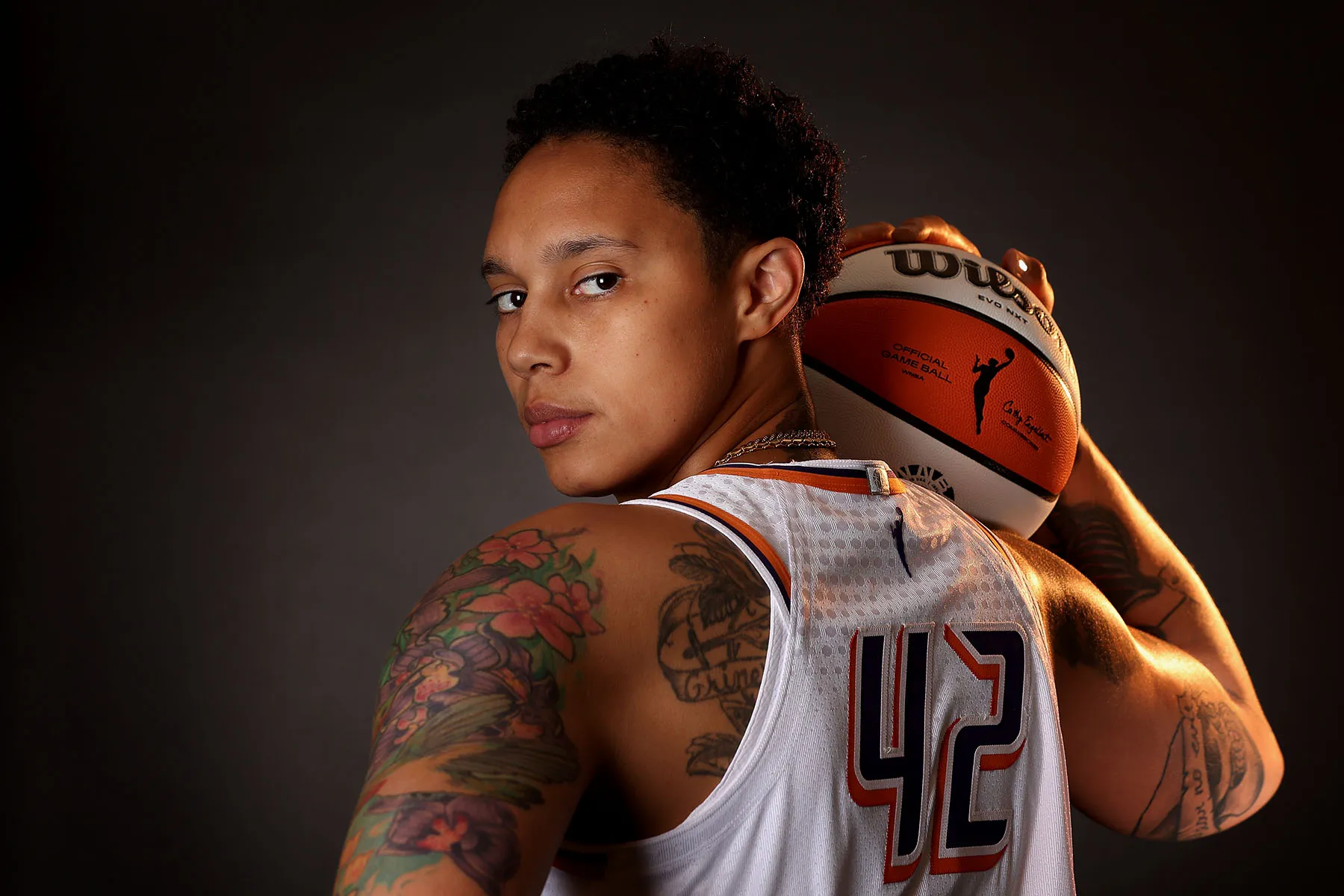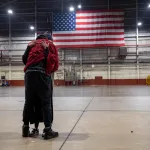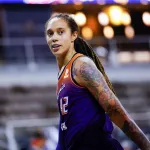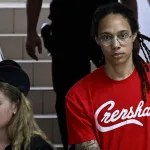This column first appeared in The Amendment, a new biweekly newsletter by Errin Haines, The 19th’s editor-at-large. Subscribe today to get early access to future analysis.
A social media provocateur confronted Phoenix Mercury center Brittney Griner at a Dallas airport on Saturday, getting physical with team security. The incident raised concerns about her security as the star player continues to readjust to life and return to basketball six months after she was freed from a Russian prison.
Griner is a queer Black woman, and so her race, gender and sexuality have made her a target for harassment and criticism and put her safety at risk. The incident Saturday would not have occurred if Griner and her teammates had been traveling on a charter flight, as their NBA counterparts do during the season. And it may not have occurred if she hadn’t played overseas last year, as many WNBA players do, to make up for the pay inequity they face at home and maximize their peak athletic window.
The incident intersects with several aspects of our society, occurring as the country is marking Pride Month and Juneteenth. But it is notable that the June 10 encounter also happened on the 60th anniversary of the Equal Pay Act.
While the law doesn’t require that the WNBA and NBA be treated the same, the milestone is a reminder of the disparities that persist between the leagues and the wider issue of full workplace equality.
The Equal Pay Act addresses not only salary, but all forms of compensation, including accommodations, reimbursement for travel expenses and other benefits. The issue of charter flights may not seem relatable to many Americans, but sports can often present an opening for a larger understanding of issues in our society.
What happened to Griner last weekend reminded me that as the country marks this milestone, equal pay is really only the beginning of a broader conversation — and that women’s safety at work is also tied to their economic opportunity.
“If the workplace isn’t safe for women, then the workplace will never be equal,” said author and workplace and equity consultant Minda Harts, someone I turn to often to think through this issue. “Brittney and other working women shouldn’t have to wait for something really bad to take place at work before leadership takes a stand.”
The NBA, now nearly 80 years old, brought in $10 billion in revenue last year, a figure that has doubled in the last decade. The WNBA, started in 1996, posted about $60 million in revenue in 2022 and does not run a profit. The NBA is older and larger, and has higher popularity, viewership and attendance than the WNBA — a difference that can’t be disentangled from the lower promotion, investment and media coverage the WNBA gets.
WNBA teams have flown commercially since the start of the league in 1997, but there has been a push from players in recent years to make charter flights the league standard. It’s had some success: In April, the league announced it will expand charter flights for all postseason games and regular season games where teams have back-to-back games on the schedule.
Mercury coach Vanessa Nygaard told reporters Sunday that the team is taking steps to “ensure that our players and our organization and our staff are safe.”
“We will be making [travel] adjustments that maybe should have happened before, but right now we’re going to prioritize the safety of our players and we’ve seen that the organization has supported us,” Nygaard said.
The WNBA granted Griner permission to charter her own flights ahead of the season — a solution that may address her personal safety, at her expense, but not the league-wide equity issue.
It’s not just Griner who could be a target — the WNBA, its teams and many of its players have been outspoken on issues of social justice, a stance that has attracted backlash from sports fans and others in a polarized political climate.
Nicole LaVoi, director of the Tucker Center for Research on Girls and Women in Sport at the University of Minnesota, said that in addition to security concerns for Griner and others, player well-being is a factor.
“For a professional athlete that needs their body to be in the best shape to perform, the less hours you spend in the air fatiguing yourself, disrupting your schedule … that impacts your performance,” LaVoi explained, adding that the wear and tear only gets worse as players age. “We’re saying to them, ‘You perform your best, but we’re giving you subpar conditions to do so.’”
Teams have complained that charter flights are too costly and can be an unfair advantage for teams that can afford to pay. The New York Liberty were fined $500,000 last year, partly for chartering flights to away games during the second half of the season.
Earlier this year, Liberty forward Breanna Stewart called for charter flights to be the norm, using her status as the then-top free agent in the league to draw attention to the issue. On Saturday, she tweeted: “This is unacceptable @WNBA we need to be protecting our players at all times, not only in arenas!”
Again, for most people issues of safety aren’t around chartered planes. But women often report feeling less safe at work and when traveling, and organizations are not always stepping up and finding solutions to support them, said Kim Crowder, a diversity equity and inclusion expert who has consulted with the WNBA and NBA as well as corporations including Target and Adobe on workplace issues.
“For the ways that women are expected to operate and move, are we providing protection and success for them to do so?” Crowder said. “What is it going to cost if your franchise player doesn’t show up?”
A temporary fix for one person, one team or one organization doesn’t go far enough, Crowder said. Instead, a systemwide solution is needed that doesn’t put the onus on those impacted by the inequity.
“The challenge is around the expectation that we be both the victim and the problem solver,” Crowder said. “Even having to think through that, in and of itself, is labor, but we expect that of women, and folks from historically marginalized backgrounds. We should have a say in what the solution is because we may have the answer — but that doesn’t mean we want to or should have to execute it.”
Harts said the WNBA isn’t the only industry that isn’t keeping women safe from unequal disparities. But the lack of safety for some WNBA players also leads to broken trust between them and the league, Harts added.
“Every time there is not enough security or a chartered flight available, those women are reminded that if this was the NBA, they wouldn’t have to fight for the privilege of protection,” she said.
The message for WNBA players is the same as for other working women: that they don’t matter as much as the men doing similar jobs, that they don’t deserve the same treatment, that people aren’t interested in them, and therefore they don’t make as much money — and don’t deserve the same perks.
The pay gap persists in the WNBA — where the average salary is about $100,000, compared with $9.6 million for the average NBA player. America’s working women currently make 82 cents for every dollar a White man makes — and for Black women, it’s only 58 cents.
Players and employees in the American workforce are increasingly demanding and expecting change.
There has been progress on employee benefits for this generation of WNBA players, particularly on issues of parental leave, child care stipends, year-round health and dental insurance, and coverage for domestic partners – largely gained through collective bargaining agreements.
Going forward, Crowder said employers including the WNBA should honor people’s humanity as a moral and economic imperative.
“What people are asking for isn’t even above and beyond,” Crowder said. “Now more than ever, companies that want to stand out should lean into that instead of leaning away or doing nothing.”
Her advice: Provide what is necessary so that your women team members are empowered and thrive in those workplaces.
“In the long term, you will be around much longer than your competitors who decide not to yield and reinvent themselves in the market,” Crowder said.









